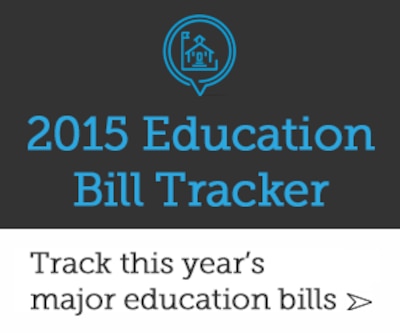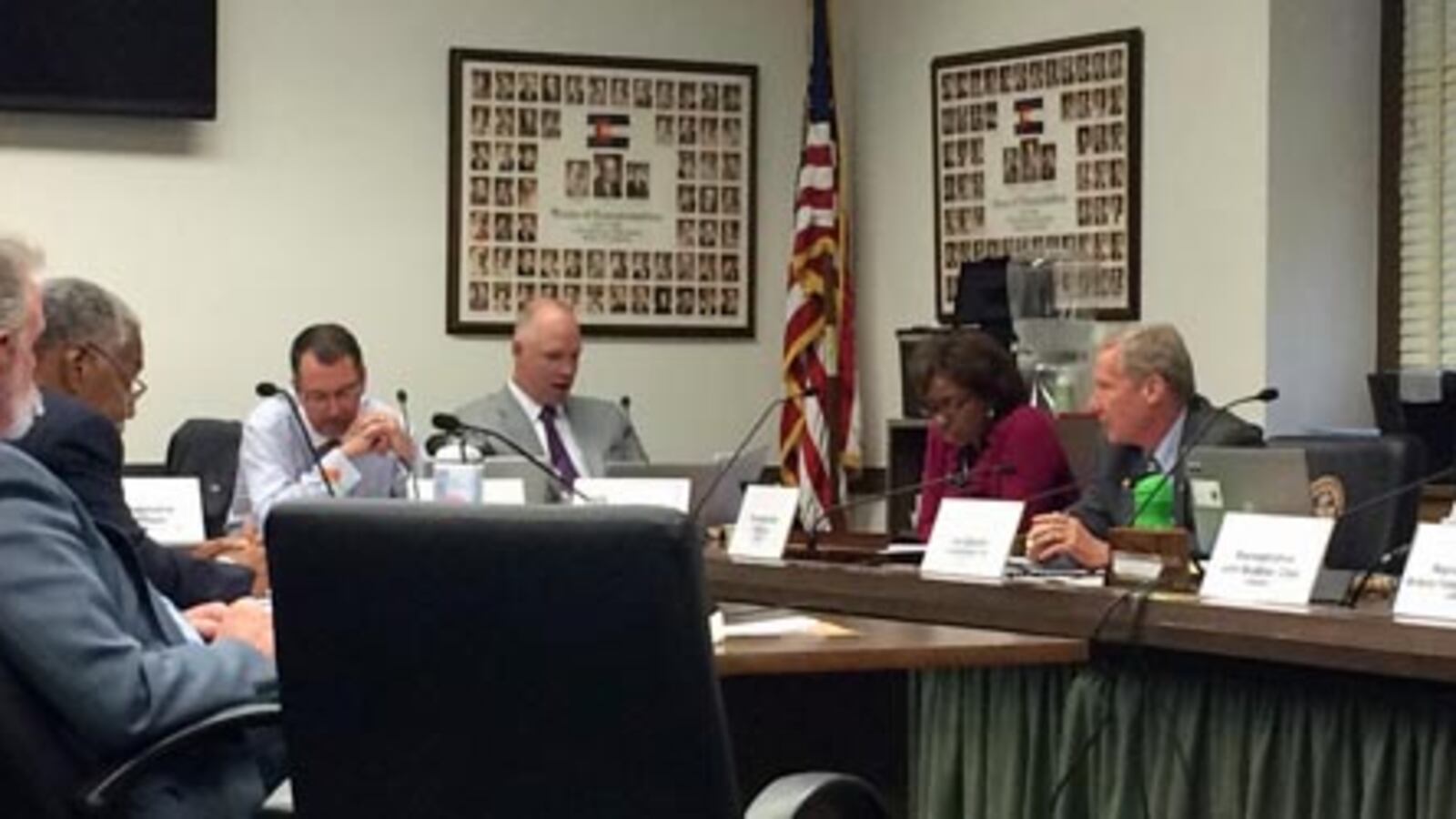The House Education Committee Monday added key amendments to a proposed testing bill, including language that would keep ninth grade language arts and math tests as part of the state assessment system.
The measure, House Bill 15-1323, was sent to the House Appropriations Committee on a bipartisan 9-2 vote, with only Republican Reps. Justin Everett of Littleton and Paul Lundeen of Monument opposed.
In addition to the ninth grade testing amendment, other notable changes include:
- A provision that would freeze the state rating system for schools and districts for the 2015-16 school year, a nod to concerns that results from the new tests given this spring will come too late and will be skewed by student opt-out numbers, making them unreliable to be used for accreditation. The amendment passed 8-3.
- A related amendment that forbids school districts from using student achievement data derived from state test results for teacher evaluations. Districts could continue using locally generated growth data. Districts have had flexibility this school year in using student growth for evaluations, and the amendment would apply to next school year. It passed 6-5.
- A change to the original bill making social studies tests optional for districts. That amendment passed 8-3.
The committee killed two amendments that would have given districts the ability to choose among multiple tests to fulfill state requirements. A related amendment that would have required the state to pull out of the Common Core State Standards and create new content standards was ruled out of order.
Approval of nine amendments was a political compromise to get the bill out of committee. The amendments cater to the desires of individual members and of education interest groups. And no one expects the committee vote is the last word on testing.
“I understand this is not the perfect bill, nor do I think we will see one,” said Salida Republican Rep. Jim Wilson, a prime sponsor of the measure. The other cosponsor is Aurora Democrat Rep. John Buckner, who is chair of House Education.
“We do anticipate there will be continued discussion as this bill goes forward,” Buckner said.
The Senate Education Committee last Thursday passed its own bipartisan testing bill – plus two others (see story). While the main Senate and House bills share some elements, there also are significant differences.
Lundeen, the former chair of the State Board of Education and a dissenter on many of the amendments, warned, “There is a very different version that’s coming from the Senate” and that “the lifting ahead of us remains incredibly heavy.”
A total of 34 amendments to HB 15-1323 were drafted, but not all were offered. Nine passed, two were defeated and three were withdrawn or died for procedural reasons.
Other amendments that were approved would allow limited district pilot programs for new testing and accountability systems, would exempt some immigrant students from testing during their first year in school, require districts to prepare comprehensive testing calendars for parents, and allow paper tests.
Additional elements of the original bill, none of which were discussed Monday, would ban mandatory states tests in the 11th and 12th grades (except for the ACT test), increase the number of years in which non-English speaking students could take tests in their native language and streamline several requirements of the READ Act early literacy program and of state school readiness assessments.
The committee took testimony on the bill a week ago (see story). Several witnesses representing education reform and business groups urged the committee to continue ninth grade testing.
“I am committed to seeing that we get something through the process,” Wilson said Monday, adding that the “absolute worst thing” is if the legislature passes no testing bill this session.
See the Testing Bill Tracker at the bottom of this story for links to details about all 11 of the assessment bills introduced so far this session.
Committee passes bill to change district liability for violent incidents
Many education lobbyists Monday afternoon were paying more attention to the Senate Judiciary Committee than they were to House Education.

That’s because the Senate panel was considering two school violence bills, one of which would open districts to financial liability if they fail to exercise “reasonable care” in protecting students from violent incidents (see bill summary). Current state law generally gives government agencies immunity from such lawsuits.
The bill stems from the December 2013 death of Claire Davis, a student who died after a shooting at Arapahoe High School. Her family feels the district has not been forthcoming in in providing information about the incident, and her parents, Michael and Desiree Davis, provided emotional testimony at Monday’s hearing.
School districts are concerned that it’s difficult to define “reasonable care,” and that passage of the bill could lead to such unintended consequences as schools expelling students who might even remotely be considered threats.
Senate Judiciary approved some amendments to soften the bill, including removing a section that would have made the measure retroactive. The bill passed 4-1.
School district lobbyists face a tricky task working against SB 15-213, given that among the prime sponsors are Senate President Bill Cadman, R-Colorado Springs, and House Speaker Dickey Lee Hullinghorst, D-Boulder.
The committee also voted 5-0 to pass Senate Bill 15-214, which would establish a legislative study committee to look into school violence and youth mental health issues.
American Indian mascot bill gets preliminary floor approval
A bill that would require schools to get permission to use American Indian mascots and images received preliminary approval from the House after a spirited partisan debate Monday.
“We are trying to protect children,” said prime sponsor Rep. Joe Salazar, D-Thornton. “The psychological effect on American Indian children” is negative when they see mascot names such as “Savages” and “Redskins,” he said.
House Bill 15-1165 would create a “Subcommittee for the Consideration of the Use of American Indian Mascots by Public Schools” in the Colorado Commission of Indian Affairs. All schools and colleges with Indian mascots would have to notify the subcommittee of such uses by Sept. 15 and stop using a mascot by Oct. 1 or request subcommittee approval for continued use.
If the subcommittee doesn’t approve a mascot, a school would have two years to discontinue use. A school that didn’t stop using a mascot could be fined $25,000 a month.
Republican critics of the bill argued that changing offensive mascot names should be handled at the local level and that the proposed fines and the cost of repainting gym floors and buying new uniforms would be prohibitive for small school districts.
But prime sponsor Rep. Joe Salazar, D-Thornton, argued that the state needs to have a say because “there are communities that refuse to change.”
The other prime sponsor, Democratic Rep. Jovan Melton of Aurora, told House members, “Think about being called a savage, think about being called a redskin. This is about fairness, this is about respect.”
Rep. Don Corum, R-Montrose, said, “I’m not sure that everyone who is Native American feels redskin is offensive.” Corum’s district includes the Ute Mountain Ute Reservation.
The original bill included funding to help districts pay the cost of changing mascots, but that was stripped in the House Appropriations Committee. The House could take a final roll-call vote as early as Tuesday. The bill’s chances are iffy in the Republican-controlled Senate.
Testing Bill Tracker
Click the bill number in the left column for more a more detailed description, sponsors and other information. Click the link in the Fiscal Notes column at the right for a bill’s description and an estimate of potential state costs.

